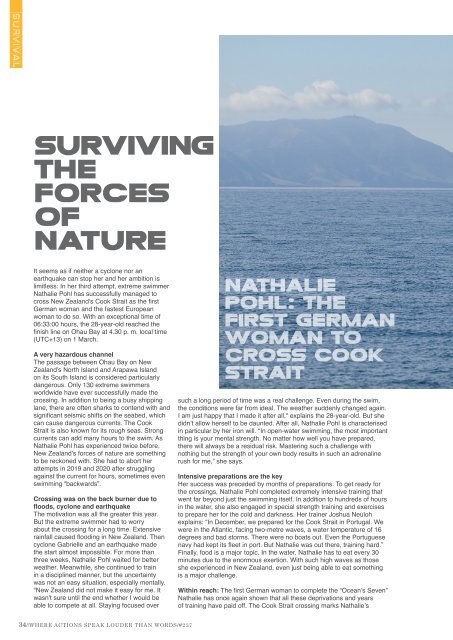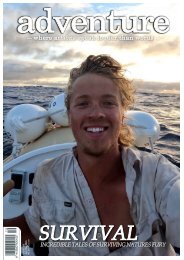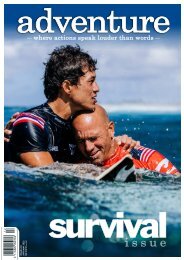Adventure Magazine
Issue 237: Survival Issue
Issue 237: Survival Issue
Create successful ePaper yourself
Turn your PDF publications into a flip-book with our unique Google optimized e-Paper software.
SURVIVAL<br />
surviving<br />
the<br />
forces<br />
of<br />
nature<br />
It seems as if neither a cyclone nor an<br />
earthquake can stop her and her ambition is<br />
limitless: In her third attempt, extreme swimmer<br />
Nathalie Pohl has successfully managed to<br />
cross New Zealand’s Cook Strait as the first<br />
German woman and the fastest European<br />
woman to do so. With an exceptional time of<br />
06:33:00 hours, the 28-year-old reached the<br />
finish line on Ohau Bay at 4.30 p. m. local time<br />
(UTC+13) on 1 March.<br />
A very hazardous channel<br />
The passage between Ohau Bay on New<br />
Zealand’s North Island and Arapawa Island<br />
on its South Island is considered particularly<br />
dangerous. Only 130 extreme swimmers<br />
worldwide have ever successfully made the<br />
crossing. In addition to being a busy shipping<br />
lane, there are often sharks to contend with and<br />
significant seismic shifts on the seabed, which<br />
can cause dangerous currents. The Cook<br />
Strait is also known for its rough seas. Strong<br />
currents can add many hours to the swim. As<br />
Nathalie Pohl has experienced twice before,<br />
New Zealand’s forces of nature are something<br />
to be reckoned with. She had to abort her<br />
attempts in 2019 and 2020 after struggling<br />
against the current for hours, sometimes even<br />
swimming “backwards”.<br />
Crossing was on the back burner due to<br />
floods, cyclone and earthquake<br />
The motivation was all the greater this year.<br />
But the extreme swimmer had to worry<br />
about the crossing for a long time. Extensive<br />
rainfall caused flooding in New Zealand. Then<br />
cyclone Gabrielle and an earthquake made<br />
the start almost impossible. For more than<br />
three weeks, Nathalie Pohl waited for better<br />
weather. Meanwhile, she continued to train<br />
in a disciplined manner, but the uncertainty<br />
was not an easy situation, especially mentally.<br />
"New Zealand did not make it easy for me. It<br />
wasn't sure until the end whether I would be<br />
able to compete at all. Staying focused over<br />
Nathalie<br />
Pohl: the<br />
first German<br />
woman to<br />
cross Cook<br />
Strait<br />
such a long period of time was a real challenge. Even during the swim,<br />
the conditions were far from ideal. The weather suddenly changed again.<br />
I am just happy that I made it after all," explains the 28-year-old. But she<br />
didn’t allow herself to be daunted. After all, Nathalie Pohl is characterised<br />
in particular by her iron will. “In open-water swimming, the most important<br />
thing is your mental strength. No matter how well you have prepared,<br />
there will always be a residual risk. Mastering such a challenge with<br />
nothing but the strength of your own body results in such an adrenaline<br />
rush for me,” she says.<br />
Intensive preparations are the key<br />
Her success was preceded by months of preparations. To get ready for<br />
the crossings, Nathalie Pohl completed extremely intensive training that<br />
went far beyond just the swimming itself. In addition to hundreds of hours<br />
in the water, she also engaged in special strength training and exercises<br />
to prepare her for the cold and darkness. Her trainer Joshua Neuloh<br />
explains: “In December, we prepared for the Cook Strait in Portugal. We<br />
were in the Atlantic, facing two-metre waves, a water temperature of 16<br />
degrees and bad storms. There were no boats out. Even the Portuguese<br />
navy had kept its fleet in port. But Nathalie was out there, training hard.”<br />
Finally, food is a major topic. In the water, Nathalie has to eat every 30<br />
minutes due to the enormous exertion. With such high waves as those<br />
she experienced in New Zealand, even just being able to eat something<br />
is a major challenge.<br />
Within reach: The first German woman to complete the “Ocean’s Seven”<br />
Nathalie has once again shown that all these deprivations and years<br />
of training have paid off. The Cook Strait crossing marks Nathalie’s<br />
successful completion of the sixth of seven stages on her way to attaining the<br />
“Ocean’s Seven” – the world’s toughest long-distance open-water swimming<br />
challenge. The seventh stage in the icy North Channel between Ireland and<br />
Scotland is planned for September. If it all goes to plan, Nathalie Pohl can<br />
crown herself Queen of the Seas. She would be the 23rd person in the world,<br />
as well as the first German woman and youngest swimmer, to complete this<br />
challenge.<br />
More information available at: www.nathaliepohl.de<br />
About the Cook Strait:<br />
• The Cook Strait separates New Zealand’s North and South Islands<br />
• It was named after the British captain, explorer and seafarer James<br />
Cook<br />
• It is 26 kilometres wide (although the distance swum is always longer<br />
due to the currents)<br />
• Some specific challenges for extreme swimmers include strong currents,<br />
storms and sharks<br />
• There are only around ten attempts to cross it every year<br />
• The water temperature is a mere 15 to 18 degrees<br />
• To date, 130 swimmers have completed the crossing<br />
• It is one of the seven stages in the “Ocean’s Seven”<br />
• Side note: The “Ocean’s Seven” involves swimming across seven sea<br />
channels on five different continents. It is important that the athlete<br />
starts and finishes on land and does not touch the support boat or wear<br />
a neoprene wetsuit. Only 22 swimmers in the world have achieved this<br />
feat. Nathalie Pohl would be the first German woman to do so.<br />
" In addition to<br />
being a busy<br />
shipping lane, there<br />
are often sharks<br />
to contend with<br />
and significant<br />
seismic shifts<br />
on the seabed,<br />
which can cause<br />
dangerous<br />
currents. "<br />
34//WHERE ACTIONS SPEAK LOUDER THAN WORDS/#237 ADVENTUREMAGAZINE.CO.NZ//35
















